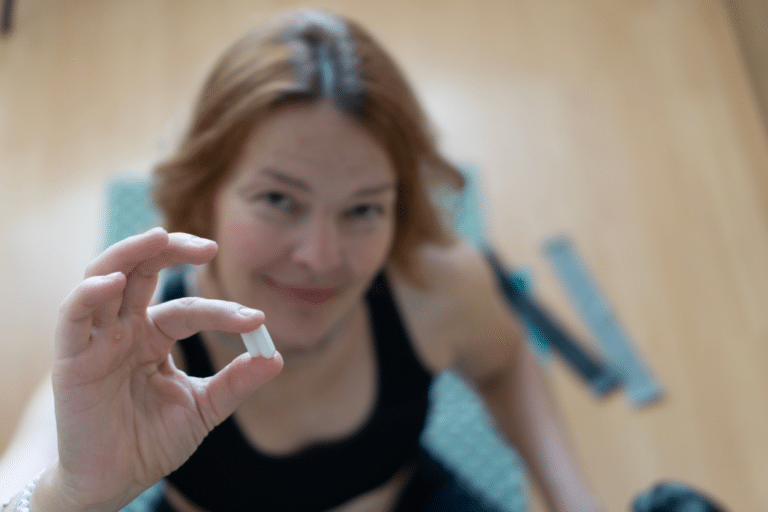You reach the end of your breast cancer treatment road and then, in menopause, you find yourself facing another possible dilemma. Many breast cancer survivors reach menopause facing a new kind of challenge: intense hot flashes, night sweats, sleep loss, and painful intimacy. Most are told hormone therapy is off-limits because of fears it could cause the cancer to return.
But current research tells a different story. Over the past 25 years, about two dozen studies have explored whether hormone therapy increases the risk of recurrence or death in women who have had breast cancer. With one exception, they have not found evidence of harm.
What We’ve Learned from the Research
The idea that hormone therapy increases recurrence risk largely stems from one early study called HABITS (Hormonal Replacement Therapy After Breast Cancer—Is It Safe?). Conducted in Sweden, HABITS was stopped early after finding more recurrences among women on hormone therapy. However, later analysis revealed important flaws.
Women in HABITS were more likely to have received combined estrogen and synthetic progestins, while those in the parallel Stockholm trial were given different regimens and followed more closely. When the Stockholm study results were published, there was no increase in recurrence among hormone users.
Long-term pooled follow-up of both studies later concluded that data were too limited for firm conclusions and that the HABITS findings likely reflected differences in hormone formulations and study design, not an inherent danger of estrogen therapy itself.
Does Tumor Type Matter?
Yes, and it’s an important distinction. The potential risk from hormone therapy depends largely on whether a woman’s original tumor was estrogen receptor–positive (ER+) or triple-negative (ER-, PR-, HER2-).
Women with ER+ tumors have cancers that respond to estrogen, so the concern about hormone therapy stimulating residual cancer cells is mostly theoretical but understandable. Even so, multiple modern studies have shown no increase in recurrence or mortality for women with ER+ disease who used systemic hormone therapy after treatment. Caution and careful monitoring are still advised, but it is not considered automatically unsafe.
Women with triple-negative breast cancer (TNBC), on the other hand, have tumors that do not respond to estrogen or progesterone. Because these cancers lack hormone receptors, estrogen therapy has no biological target to act on. For these women, there is no evidence that hormone therapy increases recurrence risk, and many experts consider it an acceptable option after treatment, especially when quality of life is severely affected.
In short, risk varies by tumor biology, but across all subtypes, the data remain reassuring. The majority of studies show no increase in recurrence or mortality from appropriately used hormone therapy after breast cancer.
Modern Evidence Paints a Reassuring Picture
Recent cohort studies and reviews continue to show that hormone therapy, when used appropriately, does not raise the risk of breast cancer recurrence or death.
A large Danish national cohort of more than 8,000 breast cancer survivors found no increase in recurrence or mortality among women who used systemic menopausal hormone therapy or vaginal estrogen therapy after treatment.
A 2025 review published in Menopause reached similar conclusions: across roughly 25 studies, there is no convincing evidence that hormone replacement therapy after breast cancer increases recurrence or overall mortality. The authors emphasized that prior fears have not been supported by data and that women deserve individualized, evidence-based discussions rather than blanket prohibitions.

Want to create a custom longevity health plan?
You’re in the right place.
I can help you with a functional approach to midlife women’s health including hormone balance, gut health, autoimmune issues, bone health, heart health and more!
What About Vaginal Estrogen?
When it comes to treating vaginal dryness, pain with intimacy, or urinary discomfort after breast cancer treatment.
Multiple studies show that low-dose vaginal estrogen does not raise estrogen levels outside the postmenopausal range, nor does it increase recurrence or death. For women suffering from urogenital symptoms, it can be an effective and safe solution that restores comfort and intimacy. There is currently discussion underway to remove the “black box” warning from vaginal estrogen products.
The Role of Quality of Life
For many survivors, menopausal symptoms are more than an inconvenience; they are life-altering. Hot flashes rob sleep, fatigue impacts work, and intimacy becomes painful or impossible.
While nonhormonal options such as SSRIs, SNRIs, gabapentin, and lifestyle strategies can help, they are not always enough. For some women, carefully selected hormone therapy may offer meaningful relief without added risk.
Women with low-grade or estrogen receptor–negative cancers, or those many years out from diagnosis, may be particularly good candidates for discussion with a knowledgeable clinician.
Putting the Evidence in Context
Here’s what the data consistently show:
- The HABITS study is the only trial to show an increase in recurrence, but the drug regimens used do not reflect what is typically used in modern practice.
- The Stockholm trial and subsequent analyses found no increase in recurrence or mortality.
- Large national cohorts show no rise in recurrence or death among women who used systemic or vaginal hormone therapy after breast cancer.
- Vaginal estrogen is safe and effective for treating genitourinary symptoms in most survivors.
- Quality of life matters. The decision to use hormones should be personalized and made in partnership with a knowledgeable healthcare provider.
The Bottom Line
The fear surrounding hormone therapy after breast cancer is rooted more in outdated studies than in current science. For most women, the evidence shows that hormone therapy does not increase recurrence or overall mortality.
If you are struggling with menopause symptoms after breast cancer, you deserve compassionate, evidence-based care, not fear. There are safe, individualized ways to restore your well-being and quality of life.
If you’d like to have a conversation about your options, schedule a consultation with me at
www.drannagarrett.com/lets-talk.
References
Bluming, A. Z., & Tavris, C. (2022). Hormone replacement therapy after breast cancer: It’s time to revisit the data. Climacteric, 25(5), 435–441. https://doi.org/10.1080/13697137.2022.2077954
EurekAlert. (2025, September 25). Experts call for change of heart on hormone replacement after breast cancer. [Press release]. https://www.eurekalert.org/news-releases/1100355
Glynne, E., et al. (2025). Menopausal hormone therapy for breast cancer patients: What is the current evidence? Menopause. Advance online publication. https://doi.org/10.1097/GME.0000000000002627
Sourouni, M., et al. (2023). Hormone therapy after breast cancer: A systematic review. Breast Cancer Research and Treatment, 202(1), 19–34. https://doi.org/10.1007/s10549-023-06821-1
Dr. Anna Garrett is a menopause expert and Doctor of Pharmacy. She helps women who are struggling with symptoms of perimenopause and menopause find natural hormone balancing solutions so they can rock their mojo through midlife and beyond. Dr. Anna is the author of Perimenopause: The Savvy Sister’s Guide to Hormone Harmony. Order your copy at www.perimenopausebook.com.
Dr. Anna is available for 1-1 consultations. Find out more at www.drannagarrett.com/lets-




